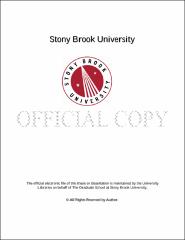| dc.identifier.uri | http://hdl.handle.net/11401/77693 | |
| dc.description.sponsorship | This work is sponsored by the Stony Brook University Graduate School in compliance with the requirements for completion of degree. | en_US |
| dc.format | Monograph | |
| dc.format.medium | Electronic Resource | en_US |
| dc.language.iso | es | |
| dc.publisher | The Graduate School, Stony Brook University: Stony Brook, NY. | |
| dc.type | Dissertation | |
| dcterms.abstract | This dissertation examines the life and work of à ngeles Vicente (1878-?), a Spanish turn of the Nineteenth and beginning of the Twentieth century writer, and her relationship to modernity. Addressing an inadequate treatment of the cultural scene of the 1900-39 period regarding women's literature, this work contributes to a corpus of writing by a cohort of female writers who have not yet been widely studied, comparing Vicente´s writing with that of her contemporaries such as Emilia Pardo Bazán, SofÃa Casanova, and Carmen de Burgos. Vicente was strongly influenced by ideas circulating at the time, especially socialism, feminism and theosophy, and their impact on modern subjectivity formation, first in Argentina and later in Spain. I argue that Vicente is representative of the zeitgeist of the first decades of the past century especially in terms of the [de]construction of feminine subjectivity. Vicente's fiction may be classified as " social modernism," an intellectual and cultural movement produced mainly by women authors, in contrast to a canonical " aesthetic" modernism mostly associated with male writers. " Social modernism" focused on women's social roles, economic and legal inequalities and unconventional sexual arrangements. Vicente's sustained social criticism together with her problematizing of conventional modes of feminine conduct combine to make her an important representative of an emerging generation of women who were moving away from earlier models of the self-sacrificing " domestic angels" , offering a new perspective in regards to body, language and sexuality in her attempt to re-imagine women's social roles. In addition to an archive of Vicente's previous and unknown bio-bibliographical information that provides a new dimension of the author's cultural and ideological universe, the dissertation focuses on " Cuadros americanos" (1913-15), a set of short stories of Argentinian inspiration, and Vicente's fictional novels <italic>Teresilla</italic> (1907) and <italic>Zezé</italic> (1909) that offered a strong criticism of patriarchal hegemony and its impact in society, especially in regards to women's identity. | |
| dcterms.available | 2017-09-20T16:53:21Z | |
| dcterms.contributor | Charnon-Deutsch, Lou | en_US |
| dcterms.contributor | Vernon, Kathleen | en_US |
| dcterms.contributor | Flesler, Daniela | en_US |
| dcterms.contributor | Perez-Melgosa, Adrian | en_US |
| dcterms.contributor | Zubiaurre, Maite. | en_US |
| dcterms.creator | Fernandez Gonzalez, Ana | |
| dcterms.dateAccepted | 2017-09-20T16:53:21Z | |
| dcterms.dateSubmitted | 2017-09-20T16:53:21Z | |
| dcterms.description | Department of Hispanic Languages and Literature. | en_US |
| dcterms.extent | 328 pg. | en_US |
| dcterms.format | Application/PDF | en_US |
| dcterms.format | Monograph | |
| dcterms.identifier | http://hdl.handle.net/11401/77693 | |
| dcterms.issued | 2014-12-01 | |
| dcterms.language | es | |
| dcterms.provenance | Made available in DSpace on 2017-09-20T16:53:21Z (GMT). No. of bitstreams: 1
FernandezGonzalez_grad.sunysb_0771E_11769.pdf: 6734371 bytes, checksum: f92eda8fd06fd6cfe4630967dc4fd857 (MD5)
Previous issue date: 1 | en |
| dcterms.publisher | The Graduate School, Stony Brook University: Stony Brook, NY. | |
| dcterms.subject | Literature | |
| dcterms.title | Zeitgeist modernista y el universo literario de à ngeles Vicente: Narrativa femenina de principios del siglo veinte. | |
| dcterms.type | Dissertation | |

